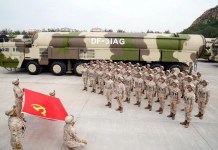Al Shabab and Boko Haram are some of the most dangerous terrorist groups in the African continent. The African nations are facing challenges in combating the spread and effects of both Al Shabab and Boko Haram. Both the terrorist organizations are highly organized and their military strategy has helped them in spreading terror. EurAsian Times looks in-depth into the biggest terror groups of Africa and their modus operandi.
Al-Shabab
Al-Shabab is a terrorist organization fighting with Somalian government to impose a strict interpretation of Islamic law. The terrorist group served in the military wing of Islamic Courts Union (ICU). It emerged as an independent organization in 2006.
Over 10,000 Citizens of Uzbekistan, Tajikistan, Kyrgyzstan, Kazakhstan Fought for ISIS: Reports
The word “Al Shabab” stands for “The Youth”. Al-Shabab is the terrorist group with 7,000 to 9,000 fighter, trying to suppress the government. They want to establish a rigid society based on Sharia law within Somalia. Al Shabab has also extended its military campaign in the neighbouring countries like Kenya.
The first leader of Al Shabab was Aden Hashi Ayro who was also part of Al Ittihad Al Islamiya (AIAI) in 1991. Later, he joined ICU, a moment to establish control over Somalia. Al Shabab mainly developed as part of the ICU and its leader Ayro helped in training militants. Ayro also conducted mass killings of international workers in the northwestern region of Somalia that drew the attention of the local and international communities.
The terror group has developed a strong relationship with the terrorist group Al Qaeda to attract foreign fighters generate fundings. Since 2010, Al Shabab has conducted multiple high profile terror attacks internationally. The first attack was outside of Somalia on July 11, 2010. The militant group came into the spotlight when Al Qaeda announced a merger between the two terrorist organizations in 2012. But till date, both are identified as separate organizations.
Al Shabab has looted media equipment’s to conduct its own broadcasts. It also banned the presence of NGO’s and other aid groups in Somalia. Apart from disturbing the peace and security of Somalia, they captured an important port city from which they received massive profit by exporting charcoal.
Afghan Taliban’s Continued Relationship with Al-Qaeda and Pakistan’s ISI: Analysis
Boko Haram
Another militant group of Africa, Boko Haram is responsible for a series of bombings, assassinations, and abductions in Nigeria. It is fighting against the government to create an Islamic state. The militant group thinks that Nigerian state is being run by non-believers of Islam.
Boko Haram, the term “haram” means forbidden. The militant group promotes a version of Islam that forbids Muslims to take part in any political or social activity inspired by western society. The political or social activities consist of voting in elections, wearing shirts and trousers or receiving a western education.
The militant group, Boko Haram consider themselves to be a group committed to the propagation of the prophet’s teaching and jihad. Their militants mainly reside in the northern states of Nigeria, specifically Yobe, Kano, Bauchi, Borno, and Kaduna. Initially, Boko Haram was called by locals as the Nigerian Taliban. The terrorist group did not participate in Nigeria’s political system because of its strong affiliation with the fundamentalist form of Islam that restricts entry into the system which is not based on Sharia or Islamic Law.
In the late 1990s, the group was organized under the Muslim cleric Mohammed Yusuf in Maiduguri, the capital of the northeastern state of Borno. The Muslim cleric Yusuf set up a religious complex, which included a mosque and an Islamic school. The militant group was not interested in only education as they wish to create an Islamic state and the school to serve as recruiting ground for jihadist. The first well-known uprising of the group begun in Bauchi, killing scores of police officers.
With the fall of Sokoto Caliphate ruling northern Nigeria, Niger, and Southern Cameroon, there is growing resistance to western education among Muslims living here. Most of them, still refuse to send their children to government-run western schools. This situation is intensified by the ruling elite that does not pay attention to the education system. More than one hundred students were kidnapped by Boko Haram in March 2018. The conflict between the terrorist group and civilians led to the displacement of people in affected regions.
Boko Haram is carrying out horrific attacks on churches, UN headquarters and even the police in northern and central Nigeria. In 2013, the government declared a state of emergency in the three northern states where Boko Haram was strongest – Borno, Yobe and Adamawa.
The two militant groups, Al Shabab and Boko Haram discarded western influences and accepted a rigid society based on Sharia or Islamic Law. Since 2008, Al Shabab closely aligned with the ideology and tactics of Al Qaeda. It’s frequently conducting suicide attacks and recruiting Al Qaeda members.
On the other hand, Boko Haram also claim close ties with global militant organizations like the Taliban and Al Qaeda. The presence of Boko Haram is limited to north-eastern Nigeria and along the borders inside Cameroon and Niger whereas Al Shabab is confined to Somalia and several places in Kenya.




